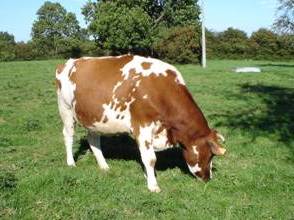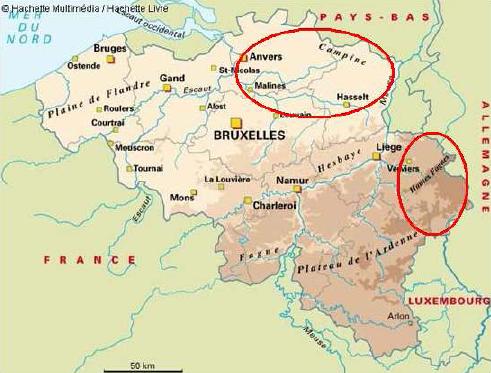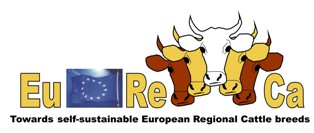Dual Purpose Red and White
 |
|
History
The geographical situation of Belgium in the middle of Western Europe has always favoured a great intermingling of population and also of their cattle.From the 13th Century, the provinces of Antwerp and Limburg were colonized with cattle coming from Denmark, Germany and mainly the Netherlands. Colour of the coat was not really well defined, the black and white and red and white coat being only fixed since the end of the 19th Century. In opposition, in the German speaking Eastern cantons (province of Liège), where breeding was mainly organized with Germany, the red and white coat was well established for a long time ago.
The real selection of Red and White (RW) cattle in Belgium started in the beginning of the 20th Century when the colour of the coat was definitively fixed by the first breeding associations. The complete standards of the breed were established in 1924.
The Dual Purpose Red and White (dp-RW) could hardly get a clear position compared to the other breeds. The milk specialisation spot was taken by the Holstein breed and the dual purpose gap to the specialized Meat Belgian Blue Breed (m-BBB) was already occupied by Dual Purpose Belgian Blue (dp-BBB) and later by French breeds. A proposal to merge the management of several Belgian red breeds (Flemish Red, White Red and Red and White) was proposed but it was rapidly forgotten.
The breed nearly not survived all this pressure. Indeed officially, Belgian RW does not exist anymore. However little populations maintained by few breeders still exists, but they use foreign bulls, notably MRY, or bulls unknown origin to keep the original dual purpose type. Almost no animals are registered or milk recorded.
Breed Geographical Distribution
In Belgium, in 1959, a population of 120,000 cows was present, especially in the provinces of Limburg, Antwerp, Liège and Brabant (delimited at North by the Netherlands, at East by the Meuse, at West by the Escaut and at South by Demer + Eastern cantons).
 |
| Origin regions of dp-RW in Belgium |
Currently, populations of dp-RW still remains in the Eastern cantons and in the Kempen region, but very few data are available.
Breed Description
In 1959, the breeding objectif for a dp-RW cow from the Kempen breeding region was a height of 1m27 and a weight of 450 to 600 kg. The coat was red and white. The head was short and thick. The hindquaters were well developed with a muscular tight. The selection wanted to erase some common defaults like bad udder (badly conformed, hanging) and weakness of the skeleton. The type of the Eastern cantons was considered to be smaller and perhaps more robust.With the infusion of Red Holstein blood in the 1980ies, the original type of the dp-RW changed. A taller cow with lighter conformation was obtained, however as the Holsteinization was not uniform, the standards of the whole population were hard to define. The same is true for the current surviving populations as the definition of remaining dp-RW stays vague especially due to the lack of pedigrees.


